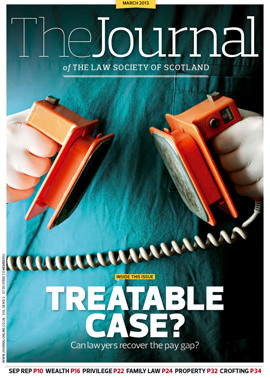Law reform roundup
Partnerships (Prosecution) (Scotland) Bill
Following its written evidence submitted in January, and oral evidence before the House of Lords Special Public Bill Committee in February, the Society submitted an amendment to cl 4 of the bill which was tabled by Viscount Hanworth. The amendment, submitted as a probing amendment, addressed the Society’s concerns with cl 4. As it currently stands, cl 4 would have the effect of imposing liability on a new partner for a fine imposed for an offence before that partner was assumed to the partnership and of which they may have no knowledge. The amendment would have protected the newly assumed partner from any direct or indirect liability due to the imposition of such a fine. The amendment was withdrawn by Viscount Hanworth after deliberation by the committee.
High Hedges (Scotland) Bill
The Property Law Committee submitted a number of amendments to the bill at stage 2. They included a change to s 5 to allow the local authority to dismiss an application for a high hedge notice if it is totally without merit, in addition to the grounds that the application is frivolous or vexatious; and a change to s 31, which will place a duty on Scottish ministers and local authorities to consult on any guidance which they want to issue on any aspect of the bill. The committee also submitted an amendment to s 15, which would ensure the person appointed to hear appeals under the bill is educated in law, and is experienced in dealing with boundary disputes and hearing appeals.
Public petitions
The Society recently made submissions on two petitions lodged with the Scottish Parliament.
PE01458: Register of interests for members of Scotland’s judiciary, calls on the Scottish Parliament to “urge the Scottish Government to create a Register of Pecuniary Interests of Judges Bill (as is currently being considered in New Zealand’s Parliament) or amend present legislation to require all members of the judiciary in Scotland to submit their interests and hospitality received to a publicly available register of interests”. In its submission, the Society states that those serving on the bench should attain the highest possible standards of judicial conduct and ethics, and that more evidence should be produced to demonstrate that (a) the judicial oath, (b) the Statements of Principles of Judicial Ethics for the Scottish Judiciary, and (c) the terms of the Judiciary and Courts (Scotland) Act 2008, which applies in relation to complaints about judicial office holders, are not effective. Accordingly, without such further evidence, the Society disagrees that a Register of Pecuniary Interests of Judges is required.
PE01455: Public access to court records, calls for the Scottish Government “to consider the need for new legislation to create a free of charge public right of access to information generated in relation to court proceedings, including all documents which have been read in open court, whether aloud or not, and to proactively publish this information online”. In its submission, the Society agrees that the public right to scrutinise the justice process is an important principle in democratic societies, but also notes that certain court documents are the property of the parties rather than the courts themselves and as such could raise both data protection issues and financial implications for the Scottish Court Service in the provision of a public right of access to any document produced before a court.
BIS consultation: street trading
In its response to the BIS consultation on street trading and pedlary laws, the Society stated that there are a number of implications for applicants, police and local authorities should the Pedlars Acts be repealed and pedlary brought within the scope of civic government licensing. In particular, pedlars would have to apply for a separate licence in each and every local government area in which they wish to trade. As well as the increased cost to the applicant and administrative burden on local authorities, a pedlar may find himself or herself licensed to trade in one area, but not in another, depending on whether that council has granted a licence or even whether that council has resolved that a licence is needed at all.
The Society therefore suggested that the Scottish Government should consider a scheme similar to the licensing of itinerant metal dealers under s 32 of the Civic Government (Scotland ) Act 1982, where a licence granted has effect to permit the licence holder to carry on business as an itinerant metal dealer anywhere in Scotland.
Full details of the above, and further information on the current work of the Law Reform Department, can be found at www.lawscot.org.uk/forthepublic/law-reform-consultations, and the team can be contacted on any of the matters above through louisedocherty@lawscot.org.uk, or follow us on Twitter: @lawscotIn this issue
- Remember, remember?
- Equal justice for all?
- Compatibility: devolution issues reborn
- Profiting from the past
- RTI for PAYE - are you ready?
- Reading for pleasure
- A modest proposal – civil marriage ceremonies for all
- Opinion column: Alistair Dean
- Book reviews
- Profile
- President's column
- Fee review: as you were
- Time to draw a line?
- The pay gap: seeking a cure
- Wealth management: Personal injury trusts - how to best invest
- Wealth management: Discretion - the model of choice
- Wealth management: Inheritance tax - discounts up front
- Wealth management: Pensions - time to look ahead
- Whose privilege is it, anyway?
- FLAGS unfurled
- Percentage game
- Rent, rent and rent again
- Sport, rights, and the internet
- An innocent mistake?
- Scottish Solicitors' Discipline Tribunal
- The trouble with in-house lawyers
- Lease of life for the High Street?
- PSG update
- Vacant and ready
- ABS in waiting
- Better ways: where to start?
- Keeping errors in check
- Ask Ash
- How not to win business: a guide for professionals
- What does a speculative fee allow?
- Law reform roundup






